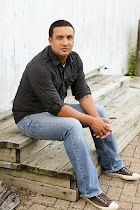The New Calvinism by David Van Biema (published in TIME magazine)
If you really want to follow the development of conservative Christianity, track its musical hits. In the early 1900s you might have heard "The Old Rugged Cross," a celebration of the atonement. By the 1980s you could have shared the Jesus-is-my-buddy intimacy of "Shine, Jesus, Shine." And today, more and more top songs feature a God who is very big, while we are...well, hark the David Crowder Band: "I am full of earth/ You are heaven's worth/ I am stained with dirt/ Prone to depravity." Calvinism is back, and not just musically. John Calvin's 16th century reply to medieval Catholicism's buy-your-way-out-of-purgatory excesses is Evangelicalism's latest success story, complete with an utterly sovereign and micromanaging deity, sinful and puny humanity, and the combination's logical consequence, predestination: the belief that before time's dawn, God decided whom he would save (or not), unaffected by any subsequent human action or decision. Calvinism, cousin to the Reformation's other pillar, Lutheranism, is a bit less dour than its critics claim: it offers a rock-steady deity who orchestrates absolutely everything, including illness (or home foreclosure!), by a logic we may not understand but don't have to second-guess. Our satisfaction — and our purpose — is fulfilled simply by "glorifying" him. In the 1700s, Puritan preacher Jonathan Edwards invested Calvinism with a rapturous near mysticism. Yet it was soon overtaken in the U.S. by movements like Methodism that were more impressed with human will. Calvinist-descended liberal bodies like the Presbyterian Church (U.S.A.) discovered other emphases, while Evangelicalism's loss of appetite for rigid doctrine — and the triumph of that friendly, fuzzy Jesus — seemed to relegate hard-core Reformed preaching (Reformed operates as a loose synonym for Calvinist) to a few crotchety Southern churches. No more. Neo-Calvinist ministers and authors don't operate quite on a Rick Warren scale. But, notes Ted Olsen, a managing editor at Christianity Today, "everyone knows where the energy and the passion are in the Evangelical world" — with the pioneering new-Calvinist John Piper of Minneapolis, Seattle's pugnacious Mark Driscoll and Albert Mohler, head of the Southern Seminary of the huge Southern Baptist Convention. The Calvinist-flavored ESV Study Bible sold out its first printing, and Reformed blogs like Between Two Worlds are among cyber-Christendom's hottest links. Like the Calvinists, more moderate Evangelicals are exploring cures for the movement's doctrinal drift, but can't offer the same blanket assurance. "A lot of young people grew up in a culture of brokenness, divorce, drugs or sexual temptation," says Collin Hansen, author of Young, Restless, Reformed: A Journalist's Journey with the New Calvinists. "They have plenty of friends: what they need is a God." Mohler says, "The moment someone begins to define God's [being or actions] biblically, that person is drawn to conclusions that are traditionally classified as Calvinist." Of course, that presumption of inevitability has drawn accusations of arrogance and divisiveness since Calvin's time. Indeed, some of today's enthusiasts imply that non-Calvinists may actually not be Christians. Skirmishes among the Southern Baptists (who have a competing non-Calvinist camp) and online "flame wars" bode badly. Calvin's 500th birthday will be this July. It will be interesting to see whether Calvin's latest legacy will be classic Protestant backbiting or whether, during these hard times, more Christians searching for security will submit their wills to the austerely demanding God of their country's infancy.The New Calvinism

Read more: http://www.time.com/time/specials/packages/article/0,28804,1884779_1884782_1884760,00.html #ixzz1YGbbaghc
The 8th Day (a post for coffee snobs) by John Rock

The 8th Day
I often joke and tell people that "a little known fact is that on the 8th day God roasted coffee - and it was very very good."
Coffee roasting is, for me, an art form rather than a science, as each coffee crop possesses its own unique flavoring due to weather conditions as well as elements of the environment. Not only does each type of bean have its own unique attributes for flavoring, these attributes are then cultivated by way of a particular roasting style (e.g. Cinnamon, City, Full-City, Espresso, and French roast). Roasting coffee by timers, bells, and whistles replaces the fantastic art with a mundane science and thus replaces good-experience with mundane-methodology. (Huh, sounds like Faith v. Relationship doesn’t it?)
I admit that I am a coffee snob, and for that I do not apologize. I learned to love coffee in the Army even though it was always bad and never meaningful, and even to this day I would much rather drink a cup of 6-hour-old Speedway coffee than a plastic bottle of soda. And so it is that my heart's desire is to experience coffee rather than just consume it day after dreary day.
I am on a quest to experience God through the goodness of His word-spoken creation – particularly coffee. I created a business to this effect, and my goal is not simply to seek out other coffee snobs but to actually create other coffee snobs. There is coffee and there is God, and both can be experienced at the same time. Do you want to see for yourself? Call on me and I can help.
~John
www.anchorbayroasts.com

